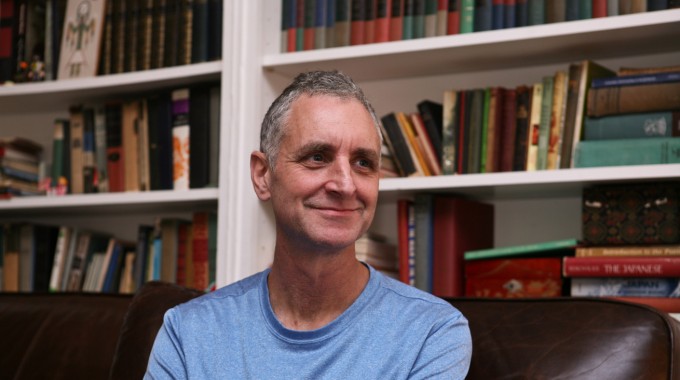If you know of a Columbia College student, faculty member, alumnus/alumna or program we should spotlight, or if you would like to submit a story, please contact:
Columbia College
Office of Communications
cc-comms@columbia.edu

Professor Emlyn Hughes GSAS’87 recruits student interns to research nuclear proliferation.
When Emlyn Hughes GSAS’87 first taught the first-year Frontiers of Science course last year, he considered his nuclear proliferation discussion to be the weakest part of his lectures.
Hughes, a physics professor, lectured on particle physics, quantum mechanics and nuclear physics for the Core science course, which brings in four scientists in different disciplines each semester to deliver three lectures on the background, context and current state of an area of research.
As he prepared for his third lecture, Hughes said, he felt confident about teaching the physics and science of nuclear weapons, but realized he wanted to know more about nuclear power and the history and politics of nuclear proliferation.
So Hughes, whose research typically focuses on particle physics, hired a group of six first-years from his class to help educate him over the course of this past summer.
“I wanted to use undergraduates to help me learn,” said Hughes, who earned his Ph.D. at Columbia and taught at the California Institute of Technology before returning to Columbia in 2006.
The goal of the summer project, Hughes said, was to go beyond the fundamentals of nuclear physics — to learn about the topic broadly so that he would have more information to present to the next year’s Frontiers of Science class. Hughes wanted to study the topic in a structured environment, and knew that nuclear proliferation was a relevant topic that students would also be excited to study.
“There are some big questions. These are the kind of things students are interested in,” he said of the nuclear proliferation topic. “These are things that are really happening in the world right now.”
Hughes said the initiative grew out of his experience as an instructor for a Frontiers of Science seminar section. Previously, he had taught a large physics class and had little interaction with undergraduates. When he started teaching a section of approximately 20 Frontiers of Science students, he got to work closely with undergraduates and realized how much he could learn from them. Hughes wanted to give students an opportunity to work in a team.
“I walked into the dean’s office and said, ‘Can you help me find four students from different fields, because I’m teaching about [nuclear proliferation] in Frontiers and I want to learn more about it.”
Hughes advertised his internship to all first-year Frontiers of Science students. Students had to send transcripts, letters of recommendations and essays on why they were interested in nuclear weapons. They also had to have experience working in a team. Several dozen students applied, and the applications were so strong that Hughes increased the number of fellowships. He worked with the Dean of Academic Affairs’ office to choose six finalists -- Ari Berg, Autumn Bordner, Daphne Chen, Mingming Feng, Andrew Pinelli and Alana Wahrit.
Hughes selected students with backgrounds in a variety of fields, from science and journalism to economics and sustainable development. He wanted to hire first-years, rather than more advanced students, because he knew that it could be difficult for first-years to find summer jobs and he wanted undergraduates who were not already involved in majors. In addition to the six freshmen, two high school students, Claudia Dodge and Alicia Kysar, and Columbia Frontiers of Science Fellow Allyson Sheffield, were also involved with some aspects of the project.
The students spent the summer meeting for a daily seminar, reading Megawatts and Megatons: The Future of Nuclear Power and doing independent research and presentations. Hughes also took them to New Mexico to visit Los Alamos National Laboratory and White Sands Missile Range, an Army, Navy, Air Force and NASA test site in south central New Mexico where the first atomic bomb was detonated in July 1945.
Halfway through the summer, Hughes instructed students to work on a “secret project” that would be a product of their summer’s work. They would present the project to him at the end of the summer with the understanding that he would show it to students in the Frontiers of Science course the following fall.
Students created a movie about nuclear proliferation. They worked on the film throughout the summer, interviewing Megawatts and Megatons author Richard L. Garwin and filming on their trip to New Mexico. Hughes said the movie was longer than it needed to be, but so powerful that he showed it in its entirety to the Frontiers of Science students this fall.
“It’s made by College students for College students,” he said. “This year’s students seemed to really enjoy it.”
Hughes plans to run the fellowship program again this summer, taking students to Geneva, where he is doing research on new particles and interactions using the Large Hadron Collider at CERN. He offered to bring back his former students, and two have accepted the offer. He’s opening up the other four spots to the Class of 2015. Applications are due to the Dean of Academic Affairs’ office on February 10.
“This was a tremendous amount of fun … [The] experience was really special,” Hughes said. “Columbia students are extremely strong. Being able to work with some of the best Columbia students was just incredible.”
Hughes said he no longer needs training to deliver a Frontiers of Science lecture on nuclear proliferation — he learned a lot last summer. But he does want to continue the project for the students.
“After last summer, I have a more activist attitude,” he said. “Now, I am interested in seeing if young people can have an impact on an enormous topic that will affect their lives. Can they change the world on nuclear proliferation? If not, we are in trouble.”
Read more about Emlyn Hughes in the September/ October 2010 issue of Columbia College Today.